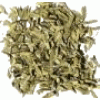Senna has always been specifically used for constipation. It is
particularly appropriate when a soft stool is required, for example, in
cases of anal fissure. The sennosides irritate the lining of the large
intestine, causing the muscles to contract strongly, resulting in a
bowel movement about 10 hours after the dose is taken. They also stop
fluid from being absorbed from the large bowel, helping to keep the
stool soft.
As a cathartic, senna can cause griping and colic,
and is therefore normally taken with aromatic, carminative herbs that
relax the intestinal muscles.
Leaves and powder are stronger in
action than the pods and are not as commonly used. Senna pods, or the
dried, ripe fruits, are milder in their effects than the leaflets, as
the griping is largely due to the resin, and the pods contain none, but
have about 25 per cent more cathartic acid and emodin than the leaves,
without volatile oil.
From 6 to 12 pods for the adult, or from 3
to 6 for the young or very aged, infused in a claretglass of cold water,
act mildly but thoroughly upon the whole intestine. Similar in action
to cascara sagrada, their slightly different chemistry does produce a
few differences in action. Whereas cascara is not activated until it
reaches the intestines, senna glycosides are readily released by
microflora of the stomach and it is about two thirds more active a
laxative than cascara.
The pods are made into tablets and other
preparations. Senna is very unpleasant tasting and it is best to combine
senna pods with aromatic, carminative herbs to increase palatability
and reduce griping, e.g. cardamom, ginger or fennel.
Properties:
stimulant, laxative, cathartic
Remedies;
Decoction:
for constipation, steep 3-6 senna pods and 1 g fresh ginger in 1 cup
freshly boiled water for 6-12 hours. Strain and drink.
Infusion:
for mild constipation, infuse 1-2 senna pods, 1 g fresh ginger, and 1-2
cloves in 1 cup freshly boiled water for 15 minutes. Strain and drink
Tincture: prescribed by herbalists to treat shortterm constipation
Toxicity:
Senna
is a good short-term laxative but should not be taken for more than 10
days since this leads to weakening of the large bowel muscles. Pregnant
and nursing women should not take senna. It should not be used by those
with chronic gastrointestinal conditions, such as ulcers, colitis, or
hemorrhoids. Drug Interactions: May antagonize antidiarrheal drugs.
Potassium
loss caused by chronic use/abuse may potentiate cardiac glycosides and
affect antiarrhythmic agents. Thiazide diuretics, cortico-adrenal
steroids and licorice root may further deplete potassium. Senna, due to
its cathartic activity, may potentiate anticoagulant therapy by reducing
absorption of vitamin K from the gut. The herb may also inhibit
absorption of dextrose from the intestines. As a cathartic, senna may
also increase intestinal transit time of digitalis glycosides,
inhibiting their absorption and cardiac action.
Senna Powder - constipation
- Product Code:MH046
- Availability:In Stock
-
R49.50
Available Options
Related Products
Senna Leaves - constipation
R47.50
Tags: Senna Powder, constipation


